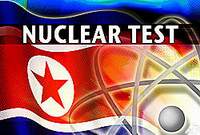World leaders argue over the use of punitive measures against North Korea
A global crackdown on North Korea's nuclear weapons program began Sunday with countries divided over how to enforce U.N. sanctions in a foreboding sign that imposing the punitive measures may not be easy.

Japan and Australia, staunch North Korea critics, prepared harsher penalties against the communist regime, South Korea was mum on details of its plans, and China, a major source of leverage over Pyongyang, refused to partake in certain measures, the AP reports.
The divergent response foreshadows what analysts predict will be a rocky road toward enforcing the global crackdown imposed Saturday by the U.N. Security Council to penalize North Korea for what it said was its first-ever atomic bomb test last week.
The Security Council's unanimous decision ruled out military action against North Korea but calls on all countries to inspect cargo leaving and arriving in North Korea to prevent any illegal trafficking in weapons of mass destruction or ballistic missiles.
The measure also bans the import or export of material and equipment used to make nuclear weapons or ballistic missiles. It orders all countries to freeze the assets and ban travel for anyone engaged in supporting the weapons programs.
Leading the charge was Japan, which said Sunday it was not only moving to enact the U.N. sanctions but also considering stricter measures of its own.
"We are already considering them, and we want to make a final decision," Japanese Prime Minister Shinzo Abe said.
Foreign Minister Taro Aso added that Japan could support U.S. forces inspecting cargo going in and out of the North, Kyodo News agency reported, the most recent sign of the new leader's pledge to give his country a more assertive role on the world stage.
Australia welcomed new U.N. sanctions as "surprisingly tough," and is likewise considering even stronger measures of its own, Foreign Minister Alexander Downer said.
Australia, along with Japan a key U.S. ally in the Asia-Pacific region, has strongly backed a stiff international response to the North's claimed nuclear test last Monday, which Canberra said threatens regional stability.
But China said it won't conduct any inspections, and its U.N. envoy called for caution.
"China strongly urges the countries concerned to adopt a prudent and responsible attitude in this regard and refrain from taking any provocative steps that may intensify the tensions," China's U.N. Ambassador Wang Guangya said.
On Sunday, things appeared quiet along the Chinese border with North Korea, and no inspections were apparent.
An official who would give only his family name, Wang, said he had not received any new instructions for inspections at Nanping, a border town, adding things had "been normal the past few days."
At Tumen, another city, the officer on duty said the inspections office was closed on Sunday and he was "unclear" about the situation.
Calls to the Dandong checkpoint were referred to the cargo inspection division, where a man hung up the phone after refusing to answer questions.
South Korea - which has taken a conciliatory approach to the North, including supplying massive amounts of aid - said it will honor the U.N. resolution but did not elaborate on its plans for inspections.
South Korea's Unification Ministry, which handles inter-Korean affairs, also issued a statement pledging to take "necessary steps" to implement the U.N. resolution.
The ministry did not give details, but later indicated it wouldn't take any action on a tourism venture and a joint industrial complex in the North, saying the "projects have nothing to do with the weapons of mass destruction program."
Critics have urged the South Korean government to halt the two cash cow projects, saying that funds may be diverted for the North's nuclear weapons program.
After Saturday's U.N. vote, U.S. Ambassador John Bolton said the next step would be to start work on implementing the resolution.
On Sunday, Russian nuclear envoy Alexander Alexeyev arrived in South Korea for meetings on the nuclear standoff. Alexeyev visited North Korea last week, the first known senior foreign official to travel there since North Korea's Oct. 9 test.
Alexeyev declined to tell reporters upon his arrival at Seoul's Incheon International Airport if he carried any message from the North.
When asked if he thought North Korea would return to the international arms talks it has boycotted since November, Alexeyev answered: "I hope."
The next U.N. secretary-general, currently the foreign minister of South Korea, welcomed the resolution. Ban Ki-moon said the resolution sent a "very clear, strong and unified message" that Pyongyang's claimed nuclear test was unacceptable.
But Ban cautioned it was important North Korea be engaged in dialogue and not simply punished through sanctions.
Subscribe to Pravda.Ru Telegram channel, Facebook, RSS!





